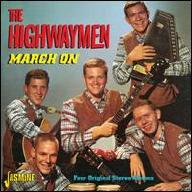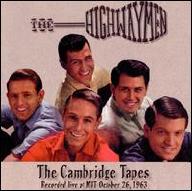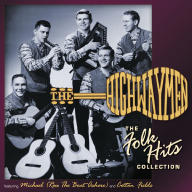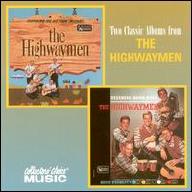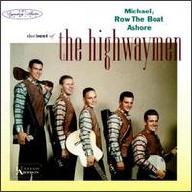Their origins go back to the late '50s, when, for a time, it seemed as though every college was spawning a folk group or two or three. California's Menlo College led the way as the birthplace of the Kingston Trio, and a year later Connecticut's Wesleyan University was where the Highwaymen were born. In the fall of 1958, Dave Fisher, Steve Butts, Bobby Burnett, and Chan Daniels met through a performance at a college fraternity show, and guitarist Steve Trott came aboard during their rehearsals. Originally named the Clansmen, for their heavily Scottish and Irish repertory (the members being ignorant in the late-'50s northeast of the negative racial and political associations that this name carried), they were popular enough at concerts around Wesleyan that they decided to try and turn professional, and to get a recording contract. The quintet auditioned for several labels without success, although they did make contact with Ken Greengrass, who became their manager. The group cut a demo tape of their entire repertory and, as an afterthought, included a song that they'd added to their shows, called Michael, Row the Boat Ashore. It was Greengrass who suggested the name change, from the Clansmen to the Highwaymen, after the Alfred Noyes poem (which was also the inspiration for one of Phil Ochs' most popular early songs). They signed with United Artists, then a new record label started up by the movie studio of the same name, in early 1959, and cut a self-titled debut album soon after under producer Don Costa.
That LP, released in the late summer of 1960, barely sold at all, despite the presence of Dave Fisher's Big Rock Candy Mountain. A similar fate befell the single pulled from the album, Santiano b/w Michael, Row the Boat Ashore, and that seemed to be the end of the story. The group was dropped by United Artists, and the quintet were back where they started. They might never have been heard from again -- the folk boom had spawned dozens of groups eager for a try at recording -- but for the efforts of an independent distributor from Connecticut named Big Ed Dinello, who began pushing the single's B-side, Michael, Row the Boat Ashore, and persuaded other distributors to promote it, and various disc jockeys to play it. The record slowly became popular across the northeast and broke out nationally in 1961, rising to the number one spot that summer. The Highwayman album, forgotten in the UA catalog, suddenly began selling a year after its release, catching everyone off guard when it charted in October of 1961, peaking at number 42. The Highwaymen suddenly found themselves major recording stars as their senior year commenced, with United Artists eager to get them back into the studio. A new album, entitled Standing Room Only, followed, along with appearances on the Ed Sullivan Show and a full schedule of weekend concerts.
The group's single, The Gypsy Rover, became another success along the lines of their first, however, when its B-side, Cotton Fields (also known as Cottonfields and The Cotton Song) proved more popular with disc jockeys. Their choice of Cotton Fields was fortuitous for more than the Highwaymen, who got a number 13 single out of it. Cotton Fields was a Leadbelly song that even the late blues-folk singer's estate had not recognized or, until then, copyrighted. It proved to be one of the most valuable copyrights owned by the Leadbelly estate and his publisher, discovered in the wake of the Highwaymen by a whole generation of listeners, among them Alan Jardine and John Fogerty, both of whom covered it successfully later in the '60s as members of the Beach Boys and Creedence Clearwater Revival, respectively. The Highwaymen were still undergraduates while all of this success was coming their way. A third album, Encore, followed, but its release seemed to presage a downturn in the group's fortunes. The accompanying single, I'm on My Way b/w Whiskey in the Jar, failed to chart during early 1962. An extended period of lineup shifts began as the members all graduated that June: Steve Trott announced his exit from the lineup in favor of enrolling in law school and was replaced by ex-Cumberland Three and Belafonte Singers member Gil Robbins, and the group was reduced to a quartet when Burnett began a required six months of active duty in the Army Reserve.
A fourth album, March On, Brothers, was issued late in 1962 by the four-man group, but neither it nor a single of I Know Where I'm Going sold anywhere near the levels of the Highwaymen's early releases. After graduation, the Highwaymen became much closer to the core of the urban folk music revival. All of them began living in Greenwich Village in late 1962 and started an extended engagement at the Gaslight Cafe. They were competitive with most of their rivals, and if they weren't topping the charts, their records still sold respectably, including a live album, Hootenanny with the Highwaymen, featuring the revived five-man lineup (Burnett having finished his military obligation), cut in front of an audience at in a recording studio and issued in June of 1963, with an October 1963 follow-up, One More Time, which included the first cover of Universal Soldier by Buffy St. Marie, whom they'd met at the Gaslight, and the Ewan McColl-Peggy Seeger-authored The First Time Ever I Saw Your Face. Another live LP, Homecoming, cut at Wesleyan, followed in the early spring of 1964.
The Highwaymen evolved during the course of the early '60s. From the relatively innocent era of the late '50s, their awareness of folk music grew. By 1964, they were cutting songs by the Almanac Singers (who were certainly among the most politically motivated of folk groups during the early '40s) and important new material by songwriters such as Tom Paxton (Rambling Boy). The group could have continued indefinitely; between the members, especially songwriters Dave Fisher and Gil Robbins, and their manager, they'd shown a knack for composing or choosing good songs, and a respectable ear for songs that would become important, so that their clean-cut early-'60s image (and their association with the early-'60s hit Michael, Row the Boat Ashore) was not a drag on their audience appeal as they moved into the more confrontational middle of the decade. The Highwaymen might've followed Peter, Paul Mary and jumped across that chasm separating the folk-pop outfits from the harder, more topical political singers of the era, but for the fact that three of its members, Burnett, Daniels, and Butts had never intended to dedicate their whole lives to music. Rather, the music was fun, and, as it turned out, a means to an end, in the form of relative financial security. They'd never planned on doing it for more than two years, and by 1964 were already passing that time limit.
The group's final UA album, The Spirit and the Flesh, appeared in the fall of 1964, and they disbanded soon after, Dave Fisher and Gil Robbins continuing with music while Burnett, Daniels, and Butts all entered graduate school. As the parting had been amicable, however, there was nothing to stop the occasional get-together of the quintet. With Burnett, Daniels, and Butts fitting it in between courses, the Highwaymen cut two LPs, The Highwaymen on a New Road and Stop, Look, and Listen, for the ABC-Paramount label. Various members reunited over the next few years in different configurations, and Fisher, Trott, and Daniels appeared at a show called The Great Folk Festival which was broadcast by ABC in 1974. Chan Daniels passed away in 1975, but the surviving members played a pair of anniversary concerts at Wesleyan University in 1987. A brief confrontation -- settled amicably -- with the Waylon Jennings-Willie Nelson-Johnny Cash-Kris Kristofferson country outfit using the same name led to a joint concert by the two groups of Highwaymen in October of 1990.
In January of the following year, the original Highwaymen were playing together again, at the annual World Folk Music Association concert in Washington, D.C., and after that resumed concertizing on a semi-regular basis. Each of the surviving members subsequently had a thriving, full-time career, in or outside of music, and the group continued to perform a few weekends out of every year for many years (and, with all of their other "firsts" in terms of cutting certain songs, may have been the only folk group in the history of the United States to boast a sitting Federal appeals court judge, in the person of Steve Trott, in their lineup). Indeed, the group received considerable acclaim for its 2007 live album When the Village Was Green, yet the Highwaymen's latter-day renaissance was dealt a serious blow, to say the least, by the deaths of Dave Fisher in 2010 and Bobby Burnett in 2011. ~ Bruce Eder, Rovi


